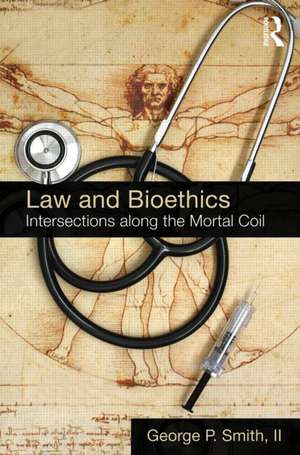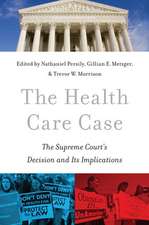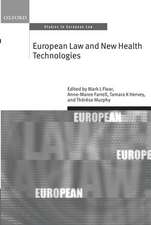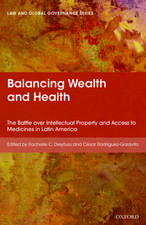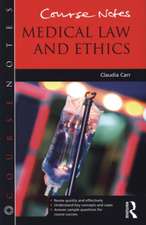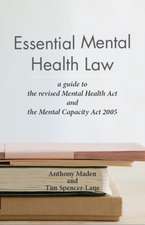Law and Bioethics: Intersections Along the Mortal Coil
Autor George P. Smith IIen Limba Engleză Hardback – 12 apr 2012
Taken as a whole, this book examines the extent to which law, medicine, economics, and bioethics interact as synergistic vectors of force in shaping and setting both personal and public responses to the complexities of biotechnology, or what has been referred to as "The New Biology." All too often, past considerations of this topic have neglected to recognise the synergistic influences of law as a catalyst for codifying contemporary values into normative standards. Professor Smith reaches the conclusion that if traditional bioethical principles are to be seen as pertinent constructs for policy making, they must be broadened through the law of public health and Human rights. Law and Bioethics: Intersections along the Mortal Coil casts law as the pivotal force in bringing stability to the ongoing debates on how to maintain bioethical relevance in decision making and in so doing, it offers an excellent overview of the current bioethical issues in medical law considered in light of recent and ongoing technological developments in medicine.
This book will be of particular interest to academics and students of Law, Political Science, Philosophy and Economics.
Preț: 822.01 lei
Preț vechi: 1104.00 lei
-26% Nou
Puncte Express: 1233
Preț estimativ în valută:
157.29€ • 164.66$ • 130.15£
157.29€ • 164.66$ • 130.15£
Carte tipărită la comandă
Livrare economică 07-21 aprilie
Preluare comenzi: 021 569.72.76
Specificații
ISBN-13: 9780415783354
ISBN-10: 0415783356
Pagini: 224
Dimensiuni: 156 x 234 x 18 mm
Greutate: 0.57 kg
Ediția:1
Editura: Taylor & Francis
Colecția Routledge
Locul publicării:Oxford, United Kingdom
ISBN-10: 0415783356
Pagini: 224
Dimensiuni: 156 x 234 x 18 mm
Greutate: 0.57 kg
Ediția:1
Editura: Taylor & Francis
Colecția Routledge
Locul publicării:Oxford, United Kingdom
Public țintă
PostgraduateCuprins
1. Introduction and Overview 2. Bioethical Challenges 3. Law, Religion, and Medical Science 4. Human Rights, Health Care, and Bioethics 5. Allocating Health Care Resources 6. Public Health Emergencies 7. Autonomy, Decisional Capacity and Informed Consent 8. An Easeful or Troubling Death
Recenzii
‘There is probably no one writing today who has a greater insight into these quandaries, and who offers a more assured approach to their solution, than George Smith’ Justice Michael Kirby, writing for Global Studies Journal, Indiana University, 2012
‘There is probably no one writing today who has a greater insight into these quandaries, and who offers a more assured approach to their solution, than George Smith’ Justice Michael Kirby, writing for Global Studies Journal, Indiana University, 2012
‘This is a work of reflective and beautifully written chapters in a timely and well-informed book. Its author is undogmatic and always thoughtful. He portrays a reverence for the human person that is, in a sense, spiritual. But his basic approach, whilst well informed on religious doctrine, is humanist, practical, and rational. In that sense, it is a reflection of the law at its best’- Indiana Journal of Global Legal Studies (2013)
‘There is probably no one writing today who has a greater insight into these quandaries, and who offers a more assured approach to their solution, than George Smith’ Justice Michael Kirby, writing for Global Studies Journal, Indiana University, 2012
‘This is a work of reflective and beautifully written chapters in a timely and well-informed book. Its author is undogmatic and always thoughtful. He portrays a reverence for the human person that is, in a sense, spiritual. But his basic approach, whilst well informed on religious doctrine, is humanist, practical, and rational. In that sense, it is a reflection of the law at its best’- Indiana Journal of Global Legal Studies (2013)
Descriere
George P. Smith, II is a leading figure in the world of medical law and ethics. During his long career he has addressed some of the most important issues in bioethics and has contributed much original thought to the debates in this field.
This book celebrates his contribution bringing together his key writings in bioethics. The chapters include previously published material, however, the pieces have been substantially updated to include more recent developments and rewritten drawing out the themes and strands which have run through Professor Smith’s thinking over the past fifty years. The book covers topics including: human rights and medical law; the allocation of resources and distributive justice; ethical relativism; science and religion; and public health emergencies. In doing so it offers an excellent overview of the current bioethical issues in medical law in light of recent and ongoing technological developments in medicine.
"This collection of essays by one of the world’s leading medical lawyers is academic research of the highest quality. With an enviable clarity of thought and force of argument, Professor Smith tackles some of the major issues facing medicine and law today. It is a tour de force by an academic at the height of his powers." Professor Jonathan Herring, University of Oxford.
This book celebrates his contribution bringing together his key writings in bioethics. The chapters include previously published material, however, the pieces have been substantially updated to include more recent developments and rewritten drawing out the themes and strands which have run through Professor Smith’s thinking over the past fifty years. The book covers topics including: human rights and medical law; the allocation of resources and distributive justice; ethical relativism; science and religion; and public health emergencies. In doing so it offers an excellent overview of the current bioethical issues in medical law in light of recent and ongoing technological developments in medicine.
"This collection of essays by one of the world’s leading medical lawyers is academic research of the highest quality. With an enviable clarity of thought and force of argument, Professor Smith tackles some of the major issues facing medicine and law today. It is a tour de force by an academic at the height of his powers." Professor Jonathan Herring, University of Oxford.
